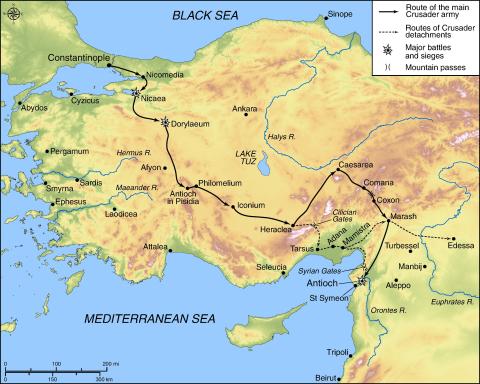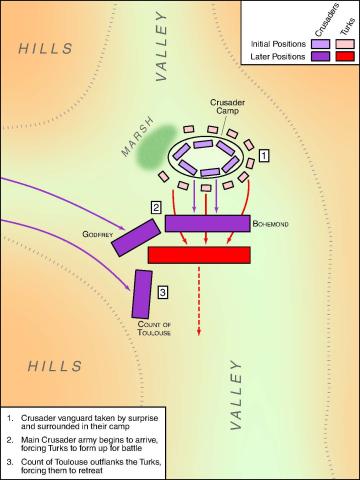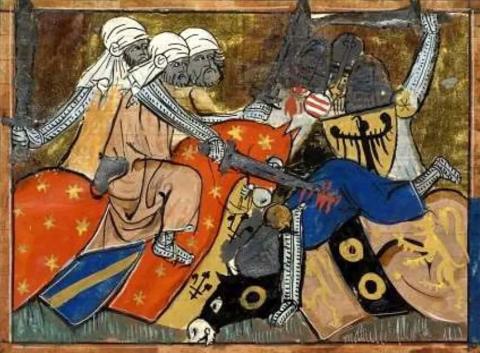The Battle of Dorylaeum
[3.9.3] Postquam vērō hōc tōtum factum est, Turcī undique iam erant circumcingentēs nōs, dīmicandō et iaculandō, ac spīculandō, et mīrābiliter longē lātēque sagittandō. Nōs itaque quamquam nequīvimus resistere illīs, neque sufferre pondus tantōrum hostium, tamen pertulimus illūc ūnanimiter gradum. Fēminae quoque nostrae in illā diē fuērunt nōbīs in maximō refugiō, quae afferēbant ad bibendum aquam nostrīs proeliātōribus, et fortiter semper cōnfortābant illōs, pugnantēs et dēfendentēs.
Vir itaque sapiēns Boamundus prōtinus mandāvit aliīs, scīlicet comitī dē Sānctō Egidīō, et ducī Godefridō, et Hugōnī Magnō, atque Podiēnsī epīscopō, aliīsque omnibus Chrīstī mīlitibus, quō festīnent et ad bellum citius approximent, dīcēns: “Et sī hodiē luctārī volunt, virīliter veniant.” Dux itaque Godefridus audāx et fortis, ac Hugō Magnus simul vēnērunt prius cum suīs exercitibus; epīscopus quoque Podiēnsis prōsecūtus est illōs, ūna cum suō exercitū, et comes dē Sānctō Egidīō iuxtā illōs cum magnā gente.
[3.9.4] Mīrābantur ergō nostrī valdē unde esset exorta tanta multitūdō Turcōrum, et Arabum et Saracēnōrum, et aliōrum quōs ēnumerāre ignōrō; quia paene omnēs montēs et collēs et vallēs et omnia plāna loca, intus et extrā, undique erant cooperta dē illā excommūnicātā generātiōne. Factus est itaque sermō sēcrētus inter nōs, laudantēs et cōnsulentēs atque dīcentēs: “Estōtē omnimodō ūnanimēs in fidē Chrīstī et Sānctae Crucis victōriā, quia hodiē omnēs dīvitēs, sī Deō placet, effectī eritis."
notes
vocabulary
3.9.3
undique: on all sides, from everywhere
circumcingō circumcingere circumcīnxī circumcīnctum: to surround
dīmicō (1): fight, struggle
spīculō (1): to sharpen (CL); to throw a spear (ML)
pondus ponderis, n.: weight
illūc: to that place, there
prōtinus: at once, immediately
mandō (1): to command, order (OLD 5)
luctor (1): contend, struggle
ūnā: together; regularly combined with cum in CL (OLD 1)
3.9.4
sermō sermōnis, m.: conversation (OLD 3)
sēcrētus –a –aum: private, confidential (OLD 5)
omnimodō: in every way



